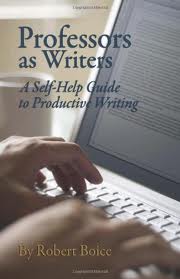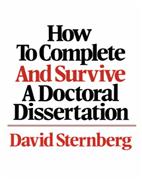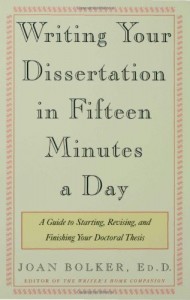Dissertation writing is its own world of joy and hurt. It involves incredible effort, research, creativity and tenacity. In the process, I have found that sometimes thinking and reading about the process itself helps. Now reading about the process of dissertation writing may become an exercise in omphaloskepsis. One might end up spinning wheels and dithering. But for me, reading about the process makes the whole thing make more sense. So…what books have I found particularly helpful?
 First, I picked up Professors as Writers by Robert Boice. Boice is a psychologist so he thinks about writing from the psychological perspective. But he doesn’t let you get bogged down in statistics and psychological surveys. No, he wants to get down to brass tacks and help you write. He hosts writing seminars regularly where he helps wayward academics get on the writing bandwagon. Three of his techniques are worth mentioning. Firstly, he encourages free-writing in short periods of 10-15 minutes to get the writing juices flowing. This seems to be a common theme among writing experts. Secondly, he advocates what he calls “generative writing” in which you maintain the same flow and speed of free-writing, but focus your writing on the topic your are wanting to actually write about at the end of the day. Thirdly, he proposes what he calls “contingency management” or what most people would call negative reinforcement. That is, if you don’t meet your writing goal for the day, he wants you to punish yourself in some way–by not taking a shower or by sending a check to organization you despise. This “contingency management” technique has led to the highest success rate among his clients, he claims. He gives a ton of other fruitful advice. I have found the book super helpful for establishing a daily writing habit. If you only get one book, this is the one to get. (I have to say that I have not experimented heavily with “contingency management”, but maybe…)
First, I picked up Professors as Writers by Robert Boice. Boice is a psychologist so he thinks about writing from the psychological perspective. But he doesn’t let you get bogged down in statistics and psychological surveys. No, he wants to get down to brass tacks and help you write. He hosts writing seminars regularly where he helps wayward academics get on the writing bandwagon. Three of his techniques are worth mentioning. Firstly, he encourages free-writing in short periods of 10-15 minutes to get the writing juices flowing. This seems to be a common theme among writing experts. Secondly, he advocates what he calls “generative writing” in which you maintain the same flow and speed of free-writing, but focus your writing on the topic your are wanting to actually write about at the end of the day. Thirdly, he proposes what he calls “contingency management” or what most people would call negative reinforcement. That is, if you don’t meet your writing goal for the day, he wants you to punish yourself in some way–by not taking a shower or by sending a check to organization you despise. This “contingency management” technique has led to the highest success rate among his clients, he claims. He gives a ton of other fruitful advice. I have found the book super helpful for establishing a daily writing habit. If you only get one book, this is the one to get. (I have to say that I have not experimented heavily with “contingency management”, but maybe…)
 Second, I bought an older book called How to Complete and Survive a Doctoral Dissertation by David Sternberg. This book, also written by a psychologist, walks you through the various stages in the dissertation process and offers advice at every turn. The author has directed many dissertation students and they have found his advice helpful. The book is okay, but founders in being too discipline-specific. If I were a psychology student, I would find it more helpful. But I have learned a few things from it.
Second, I bought an older book called How to Complete and Survive a Doctoral Dissertation by David Sternberg. This book, also written by a psychologist, walks you through the various stages in the dissertation process and offers advice at every turn. The author has directed many dissertation students and they have found his advice helpful. The book is okay, but founders in being too discipline-specific. If I were a psychology student, I would find it more helpful. But I have learned a few things from it.
 Third, I checked out Writing Your Dissertation in Fifteen Minutes a Day by Joan Bolker. She’s a psychologist (Are you noticing a pattern here?) and a writing guide at Harvard. This book is much less formal than the other two and it has a distinct casual flavor to it. What I like about Bolker’s approach is that it aims to make writing fun, almost a game. Writing is a creative process and is meant to be a wonderful, even pleasurable experience. Bolker brings that idea to life and offers tons of great maxims like “Write first!” that remind a writer what being a writer is all about. Her anecdotes are amusing and offer various approaches to the task of getting the writing done.
Third, I checked out Writing Your Dissertation in Fifteen Minutes a Day by Joan Bolker. She’s a psychologist (Are you noticing a pattern here?) and a writing guide at Harvard. This book is much less formal than the other two and it has a distinct casual flavor to it. What I like about Bolker’s approach is that it aims to make writing fun, almost a game. Writing is a creative process and is meant to be a wonderful, even pleasurable experience. Bolker brings that idea to life and offers tons of great maxims like “Write first!” that remind a writer what being a writer is all about. Her anecdotes are amusing and offer various approaches to the task of getting the writing done.
I suppose if I devoted as much attention to actual dissertation writing as I do to thinking about the process I may be further down the road. But then again, I may have mired myself in a mudhole back up the road. If you happen to be writing a dissertation, thesis or book, you may find these resources useful to you on your writing journey. Writing is often a lonely activity and it’s easy to bite off more than you can chew. So break it up into bite size pieces, write every day and keep the creative juices flowing!



